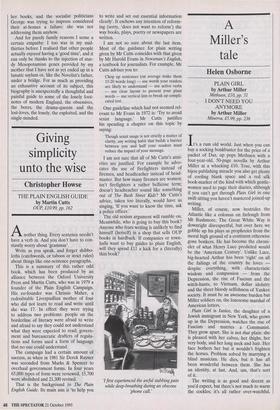A Miller's tale
Helen Osborne
PLAIN GIRL by Arthur Miller Methuen, £10, pp. 51 I DON'T NEED YOU ANYMORE by Arthur Miller Minerva, £5.99, pp. 236 t's a rum old world. Just when you can buy a socking bonkbuster for the price of a packet of Daz, up pops Methuen with a four-year-old, 50-page novella by Arthur Miller at a whacking £10. True, with this bijou publishing miracle you also get plenty of cooling blank space and a red silk book-marker of the kind with which gentle- women used to page their diaries, although if you can't get through Plain Girl in one swift sitting you haven't mastered joined-up writing.
Miller, of course, now bestrides the Atlantic like a colossus on furlough from Mt Rushmore. The Great White Way is downright disrespectful, but over here we gobble up his plays as prophecies from the moral high ground of a continent otherwise gone bonkers. He has become the chroni- cler of what Henry Luce predicted would be the 'American Century'. Unlike Luce, big-hearted Arthur has been 'right' on all the failings of the country he loves despite everything, with characteristic wisdom and compassion — from the Depression, the rise of Fascism and the witch-hunts, to Vietnam, dollar idolatry and the sheer bloody selfishness of Yankee society. It must be an awesome burden but Miller soldiers on, the lonesome marshal of American letters.
Plain Girl is Janice, the daughter of a Jewish immigrant in New York, who grows up in the Depression, watches the rise of Fascism and marries a Communist. They grow apart. She is not that plain: she is pleased with her calves, her thighs, her very body, and her long neck and hair. Her face bothers her but it wouldn't frighten the horses. Problem solved by marrying a blind musician. He dies, but it has all been wonderful between them. She has an identity, at last. And, urn, that's sort of it.
The writing is as good and decent as you'd expect, but there's not much to warm the cockles; it's all rather over-watchful, here and there betraying a cautious balanc- ing act with language as if the gravitas of reputation is lying heavily on the author's shoulders.
To be truthful I have never understood the difference between a novella and a short story and after reading I Don't Need You Anymore, a reissue of Miller's short stories from 1951-66, I don't feel much wiser. There is an almost bathetic senten- tiousness even in the best of them (The Prophecy), the sweetest (Please Don't Kill Anything) or the grittiest (Fitter's Night). Maybe it's that old Esquire hangover, but even as a comparatively young man Miller seems manacled by a mythic destiny. Just as the plays — Death of a Salesman and A View from the Bridge excepted — never quite bear the weight imposed upon them, so these pieces made me nostalgic for the tooth-and-claw ravages of Tennessee Williams.
In his 1966 preface to the short stories, Miller writes:
There is an aggressiveness in playwrighting; if there is a friendly and familiar form of art it is the story. I feel I know Chekhov better from his stories than from his plays, and Shakespeare through his sonnets, which anal- ogously at least are his stories.
Well, I don't know about that: but Miller doesn't seem more or less familiar from reading either Plain Girl, or the stories. (Although I have learnt that what you and I know as a bit of crumpet is 'baloney' in NYC.)
`He's so damned nice,' my husband puzzled after reading Timebetzds, Miller's autobiography. Playwrights are all manner of things, he pondered. But nice? America, naturally, never forgave good old Arthur the failure of his marriage to Marilyn Mon- roe, but that always seemed to be a typical- ly sentimental backlash.
Perhaps not. There are a few sharp clues in The Prince, the Showgirl and Me, Colin Clark's ripping diary of his time as third assistant on the doomed film of Rattigan's aimless frolic. Miller emerges as vain, mean and disappointed with his bride, although they were on 'honeymoon' during the shooting, already washing his hands of her when the going got sticky, as it spectacular- ly did. 'Good-hearted, no', observes Clark. Some painful years later, Miller was to say that Monroe's plight was 'beyond me and I doubt if anyone could have helped her'. He turned his short story, The Misfits (reprint- ed here), into a film for her, ostensibly as a therapeutic gesture, but who knows? If Clark — a sharp spectator, to say the least — is to be believed, maybe more an act of absolution?
All this is ancient history and the autho- rial voice in these two publications betrays little irony, let alone self-doubt. Yet, maybe, just once in olden days, there was a chink in Miller's knightly caparison and even the possibility of human fallibility slightly dilutes the stickiness of Methuen's obsequious bon-bon.











































































 Previous page
Previous page